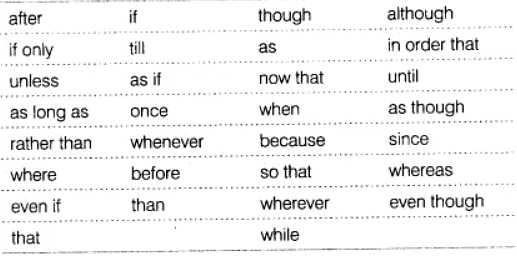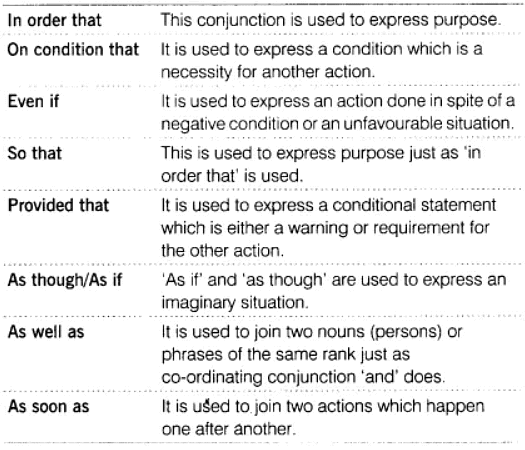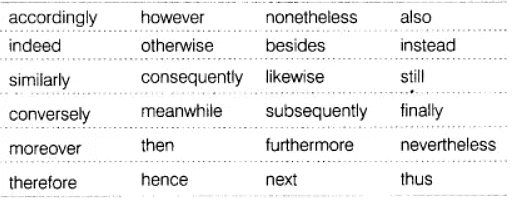Conjunctions class 8 | English Grammar Class 8 PDF Download
Conjunctions
Conjunctions are words that connect or join other words, phrases, or sentences together.
For Example:
- A boy and a girl.
- The music was loud nevertheless it was enjoyable.
Types of Conjunction
There are five types of conjunctions:
- Coordinating conjunctions,
- Correlative conjunctions,
- Subordinating conjunctions,
- Compound conjunctions and
- Linking adverbs and Transition words.
1. Coordinating Conjunctions: The coordinating conjunctions are used to connect words, phrases and clauses of equal ranks.
The coordinating conjunctions include: (and, but, or, nor, for, yet, so).
- And: It is used to combine two words, sentences or ideas.
Example:- I like to drink tea and coffee.
- He eats cake, chocolate, pastry and chips.
- But: It is used to connect to contrast ideas.
Example:- Andy likes red, but Sophie likes blue.
- I am dancing, but she is singing.
- Or: It is used to express a choice between two things.
Example:- You can eat it with a fork or a spoon.
- You are making the diagram horizontally or vertically.
- Nor: It is used to combine two words or ideas both of which are to be negated.
Example:- Ram is drinking neither hot chocolate nor coffee.
- Kiran has not come nor has Shyam.
- For: It is used as a conjunction of purpose or reason.
Example:- I cannot attend the meeting for I am unwell.
- I am not willing to spend so much money on it for it is very expensive.
- Yet: It is used to express that something has not happened but you expect it to happen.
Example:- I am not very comfortable doing it yet I will try doing it.
- Rocky terrorises the poodles next door yet adores the German Shepherd across the street.
- So: It is used as a conjunction of result or consequence.
Example:- Everyone was busy in work, so I brought all the items myself.
- All the rooms of the hotel were occupied, so I had to shift here.
2. Correlative Conjunctions: Those conjunctions that are used in pairs to connect two words, phrases or sentences are known as correlative conjunctions.
- Either….. or: It is used to show choice between two things.
Example:- Either Max or James has taken the pen.
- I will drink either cold coffee or ice tea.
- Neither… nor: It is used to refuse both of the choices.
Example:- I will go to neither Jaipur nor Jaisalmer.
- Neither they are writing nor are they allowing me to write.
- Both…. and: It is used to combine two ideas.
Example:- My brother is both smart and intelligent.
- I will eat both North Indian food and Chinese food.
- Whether…… or: It is used to express doubt or choice between two things.
Example:- Tell me whether you will do it or not.
- Do you know whether it will be raining today or not?
- Not only…… But also: It is used to express the inclusion of more than one thing.
Example:- She is not only a dancer but also singer.
- We are not only composing the music for a film but also directing a film.
3. Subordinating Conjunctions: A subordinating conjunction joins a clause to another on which it depends for its full meaning.
Here is the list of the subordinating conjunction:
- After: It is used to express the sequence of happening of two things.
Example:- I will drink the milk after my brother drinks it.
- You could go and play after you have done the dishes.
- If: ‘If’ is used to express a condition in the clause.
Example:- If you work hard you will pass.
- She may look beautiful if she uses this cream.
- Though, Although and Even though: It is used to show a contrast between the two clauses.
Example:- Though he is poor, he is honest.
- Though she was intelligent, she failed.
- I am happy although I want to be more.
- Although they are good at it, they did mistakes.
- I was late to my work even though I helped the old lady.
- If only: It is used to show a specific condition stated in the clause.
Example:- If only, I would be a Prime Minister.
- I could get there, if only, tomorrow.
- Till: It is used to show the extent of time in the clause.
Example:- Wait here till I come.
- He practised for the exams till late.
- As: It is used to show time, cause and reason in a sentence.
Example:- As I left my home, I found a purse.
- She is weak as she was ill.
- In order that: It is used to show the purpose in the sentence.
Example:- We eat in order that we may live.
- She walked faster in order that she could got the bus.
- Unless: It shows the negativity stated in a condition,
Example:- You will not pass unless you study.
- She will not stop crying unless she meets her father.
- As if: This is used to show an imaginary condition in a sentence.
Example:- He talks me as if he were my boss.
- She behaves as if she were a dictator.
- Now that: This is used to show a current situation which is the outcome of some past event.
Example:- Now that it is clear India is in the semifinal, we are celebrating.
- Now that her marriage has been fixed she wanted to quit her job.
- Until: It shows the negativity related to time in a sentence.
Example:- Do not go until I come.
- They are not ready to pay until they get the house.
- As long as: It is used to show the extent of time and its duration related to an event.
Example:- As long as electricity is supplied, the machine will run.
- She is the new captain as long as the previous captain recovers.
- Once: It shows the limited frequency of an event to one.
Example:- Once she was in England.
- I take tea once in a day.
- When: It shows the time related to an event in a sentence.
Example:- I know the time when she was born.
- She is aware when they could harm her.
- As though: It shows the manner of an event in the sentence.
Example:- He showed the anger as though he were the victim of it.
- She cared the baby as though she were her mother.
- Rather than: This is used to show preferences or choices in a sentence.
Example:- She would die rather than beg.
- I would live in Delhi rather than London.
- Whenever: This shows the definite situation in a sentence.
Example:- Whenever I wanted to meet him, he didn’t come. .
- I keep myself in my mother’s cap whenever I feel sad.
- Because: It is used to express the reason of an action.
Example:- I will eat a pizza because I am hungry.
- We have to clean the house because tomorrow is Diwali.
- Since: This is used to show a time reference in a sentence.
Example:- I have been doing this since January.
- She may pass since she had studied this subject.
- Where: It shows place or position specification in a sentence.
Example:- I do not know where it is to be kept.
- She may go where she wanted to.
- Before: It is used to show a position, a time that states an event finished earlier.
Example:- Get ready to go before the jury.
- She had written a letter before me.
- So that: It is used to show a result or an outcome of any event.
Example:- She is reading so that she can pass.
- India is planning to enter manufacturing so that revenue can be generated.
- Whereas: It shows the contrast between the two clauses.
Example:- She is intelligent whereas her brother is not.
- America is developed whereas India is developing.
- Even if: It is used to put a stress on the given conditionals.
Example:- I shall not give it you event if I am told officially.
- She will continue her education even if she gets married.
- Than: It is used for the purpose of comparison.
Example:- It is better to leave than doing it.
- It was easier said than done.
- Wherever: It is used to put positional stress in a sentence.
Example:- I shall go with you wherever you go.
- Police shall take him out no matter wherever he has hidden himself.
- That: It is used to join the two different clauses in the sentence.
Example:- She told me that she was a poet.
- They know that you can be handy.
- While: It is used to combine the two dynamic verbs that may be simultaneous or may not be.
Example:- I was reading while eating.
- She was talking while crossing.
- On condition that: It is used to express a condition which is a necessity for another action.
Example:- I can give you this book on condition that you will keep it safe.
- She returned the phone on condition that he would never irritate her.
- Provided that: It is used to express a conditional statement which is either a warning or a requirement for the other action.
Example:- You may go on leave provided that the project should be finished on time.
- She will marry you provided that she would be allowed to study further.
4. Compound Conjunctions: Compound conjunctions are the groups of words (phrases) that are used as conjunction.
5. Linking Adverbs and Transition Words: These are used to connect two independent clauses or sentences. The linking adverbs and transition words are used to provide transition between ideas.
Linking adverbs and transition words include:
|
28 videos|103 docs|37 tests
|
FAQs on Conjunctions class 8 - English Grammar Class 8
| 1. What are conjunctions and why are they important in a sentence? |  |
| 2. Can you give examples of different types of conjunctions? |  |
| 3. How do coordinating conjunctions differ from subordinating conjunctions? |  |
| 4. How can I identify conjunctions in a sentence? |  |
| 5. What are some tips for using conjunctions effectively in writing? |  |





















